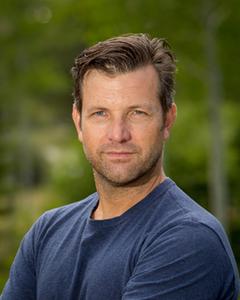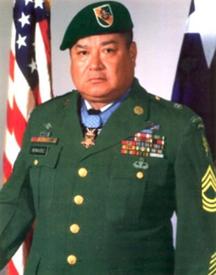
|
|
| photo: Jeff Warner | |
Eric Blehm is a journalist and the author of the bestsellers Fearless and The Only Thing Worth Dying For. He got his start in journalism as the editor of TransWorld SNOWboarding magazine, and his first book, The Last Season, was the winner of the National Outdoor Book Award and was named by Outside magazine as one of the 10 "greatest adventure biographies ever written." He lives in Southern California with his wife and children. His new book, Legend, recounts a harrowing mission led by Green Beret Staff Sgt. Roy Benavidez to rescue a Special Forces team trapped behind enemy lines during the Vietnam War.
When did you first hear about Roy Benavidez's story?
I consider myself pretty well read in the Special Forces history genre, but one day a couple of years ago, my agent, Christy Fletcher, forwarded me an e-mail from her mother. I didn't know it at the time, but her mom is a big fan of my books Fearless and The Only Thing Worth Dying For, and she had seen something online that gave a brief summary of Roy's actions during the Vietnam War. She said that the world needs to hear more stories about positive role models and heroes who have served their country. "This should be Eric Blehm's next book," is how she ended her message. I was so blown away by Roy's story that at first I thought it couldn't possibly all be true. Then I started to ask friends and contacts who are former or active-duty Green Berets, SEALs and Rangers if they had heard of Roy in their circles. All of them had and most referred to him by one word: legend. I contacted Roy's family, and that's how it all began.
Considering that Roy's heroics took place in 1968 and his battle to be recognized with a Congressional Medal of Honor was ended in 1980, what inspired you to write a book about him now?
Stories get lost to history. I was born in 1968, and Vietnam was only a few paragraphs of my U.S. history books in middle and high school. I wanted to introduce Roy's story--as well as some history of the Vietnam War--to the current generation of military readers, and I also wanted to delve into the entire story of the rescue mission he volunteered for. The brotherhood between the men on the ground and the assault helicopter companies that supported them in Vietnam has rarely been told. There are stories that focus on the ground forces and others that focus on the air component, but few combine both and fewer still share the political quagmire of the era. This single mission is a microcosm of the Vietnam War as a whole--the good, the bad, and the ugly--told from the perspective of the men who were there. So to come full circle, why write about a story that happened in 1968? Because we owe it to the men who fought in Vietnam, and all our past wars, to not let them be lost to history, to honor their service and sacrifice by retelling their stories without personal bias.
 |
|
| Roy Benavidez | |
Benavidez's acts of heroism have already been the subject of two books. Did you seek to show the events of May 2, 1968, from a different perspective?
The full story of the covert mission on May 2 has never been told. Nobody who was on the ground with Roy was ever interviewed for the past books that focused on his actions. I was fortunate enough to interview one of the survivors from the ground who had never told his story further than a statement. Retired Green Beret Brian O'Connor spent a couple hundred hours answering my questions and recounting his memories that will be revealed for the first time in Legend. The perspective from the air, the story of the 240th Assault Helicopter Company, was never fully told, either. Consider Black Hawk Down by Mark Bowden. If it had been told by one perspective, one character, there would be only one glimpse into a battle that was, by nature, foggy already. Bowden's research presented a more all-encompassing view of the mission by presenting the point of view of the pilots, the men on the ground, the command, some of the politics, the rescue efforts. To me, that is telling the entire story (or as much as possible given resources), and that is what I strived to achieve with Legend. There are other examples, such as the memoirs by Louie Zamperini that came out long before Laura Hillenbrand's Unbroken. I believe there is always room to retell a story, especially when new perspectives and information are available. We owe it to the men and to history to hone the important stories without embellishment: the power is in the truth. I would rather have a hole in one of my stories than fill that hole with B.S. It dishonors the men and their actions.
Many of your books are about soldiers and outdoorspeople in extreme, harrowing situations. What is it about these do-or-die, life-threatening situations that attracts you? Do you subscribe to the belief that one does not truly appreciate life until one is on the edge of losing it?
I never served my country, and after 9/11, as a writer, I asked myself, "What can I do? What's my part?" I have always had a deep respect for those who serve, whether it be the National Park Service or the military, and I read many stories of adventure and war as a kid. They were my windows into history. Post-9/11, I realized history is happening right now. The World War I and World War II veterans are passing away, and their stories are going with them. I wanted to try and capture such stories while memories are still fresh, to preserve history and honor their service. After writing articles and two books on our wars in Afghanistan and Iraq, I heard about Roy's story and thought, hmmmm, it's time I dive back in history while these Vietnam veterans are still alive to talk about it. I could not have told this story without their support and willingness to share their memories. Legend is my book, but it's their story and I hope I've honored them with as close to the truth as I could get considering the fog of time and war.
As far as appreciating life--no, I don't think you have to almost lose it to love it. I have been in a couple of dangerous situations myself (caught in an avalanche when snowboarding, pummeled in big surf... as well as developing a pulmonary embolism after shoulder surgery), but my appreciation for life came from watching my mother battle and then die from cancer when I was a teenager. During that four-year period, I spent a lot of time in hospitals with my mom and escaped into many, many books--Jack London, as well as mountaineering stories and war stories where people were pitted against impossible odds. Looking back now, maybe I was drawn to them because they gave me hope for my mom. At the moment, I just recall getting hooked and turning pages that kept me in the story, and out of those hospital rooms.
What do you consider to be the popular legacy of the Vietnam War? Is this book in any way a response to that perceived legacy?
There are many misconceptions about the Vietnam War and Vietnam veterans. One is that they were all draftees who did not believe in what they were fighting for; another is that the local warriors who fought alongside them, various ethnic groups from South Vietnam, were all cowards. In Legend, you'll read an unbiased, non-political, non-stereotypical look at the war from the perspective of the men who were there in the air and on the ground--all building toward one horrific battle borne from a mission gone wrong. In some ways, this is a microcosm of the entire war. In the end, the men and women who served in Vietnam came home without a thank-you. As one veteran I quote in the book told me, the Vietnam vets took the bullet for future generations of warriors. Eventually the population realized it was wrong how Vietnam veterans were treated, and today, even if they don't agree with the politics of our current wars and foreign policy, the majority of U.S. citizens will shake a person-in-uniform's hand and say thank you.
In your mind, are there any specific takeaways or lessons to be learned from Roy Benavidez's story?
Roy's story of comeback began long before he was in the army. Roy was orphaned as a child, picked sugar beets and cotton as a migrant worker, dropped out of school when he was 14, and experienced segregation and racism in rural Texas. He was an angry, bitter youth who could have easily gone the route of crime, but because of the people who mentored him and his decision to join the military, he overcame it all. Roy's life experiences prepared him for that moment he jumped alone into a horrific battle--and allowed him to accomplish what he did. I believe that you are a product of your life experiences, but it's up to you to spin those experiences in the right direction. Roy spun the bad into good and, by doing so, he saved the lives of eight men. Instead of a convict, he became a legend. --Alex Mutter

